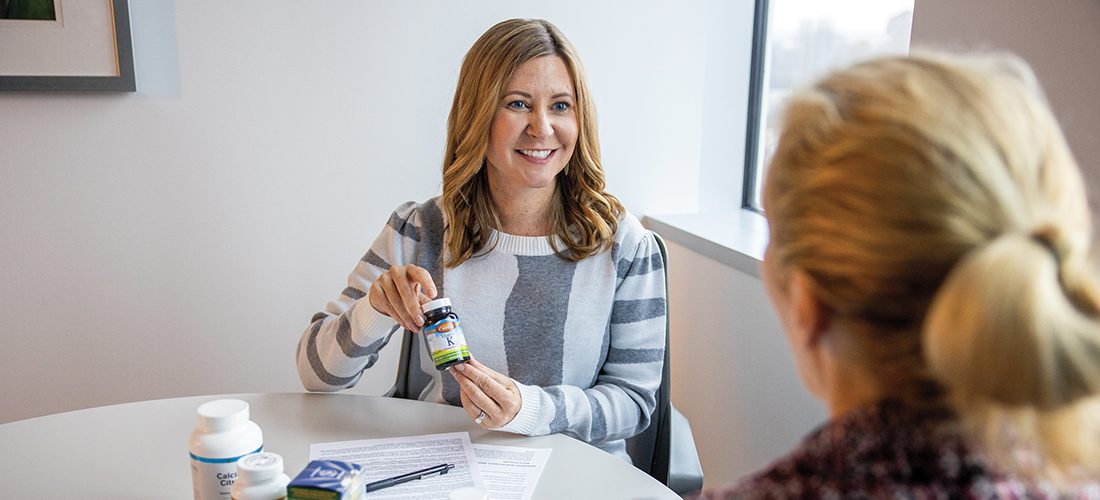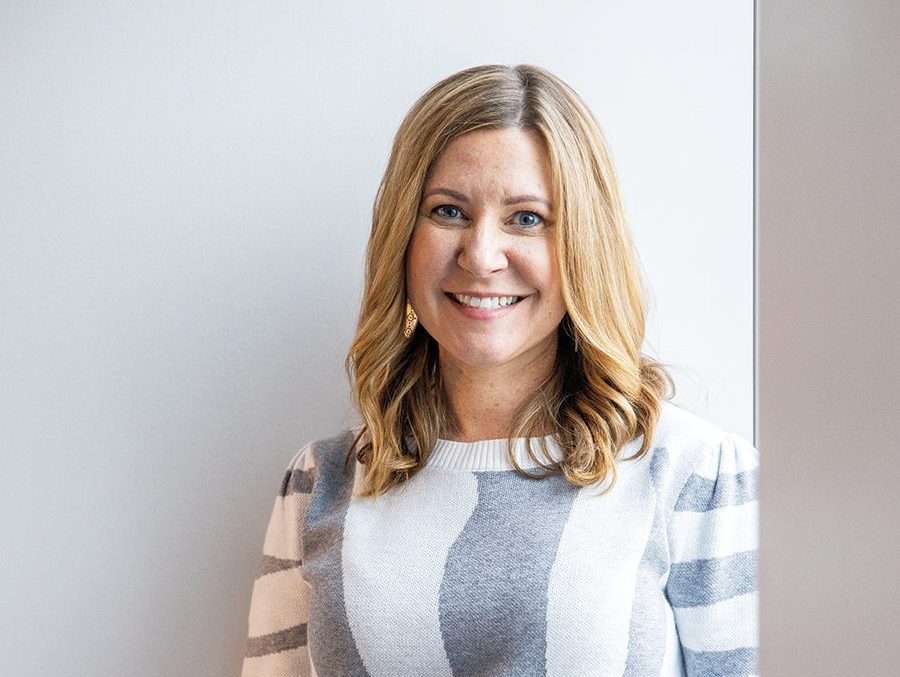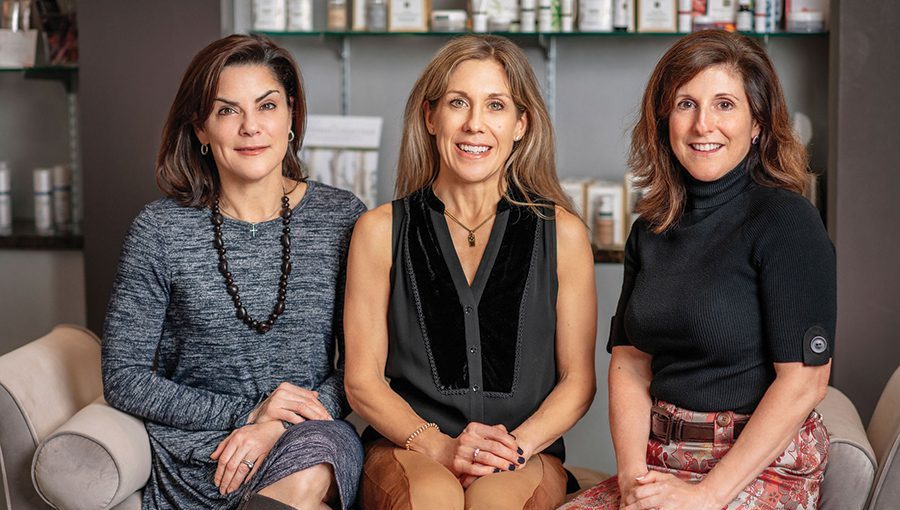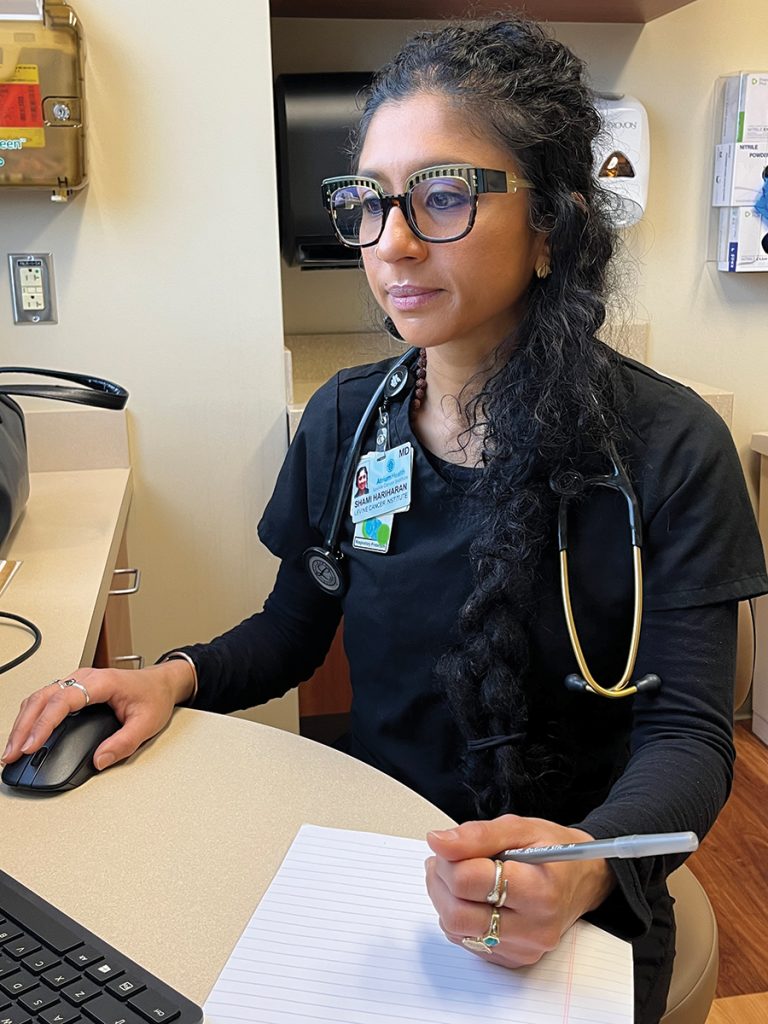Whole-person wellness
January 1, 2023

Charlotte health care providers take an integrative and functional approach, combining conventional treatments with nutrition, exercise and self-care of mind, body and spirit.
by Michael J. Solender
After Dr. Andrew Weil established an academic and training center for integrative medicine in 1994 at the University of Arizona, practitioners across the country launched a movement defined by a whole-person approach to wellness. By combining conventional medicine with alternative therapies, integrative medicine, along with a related practice known as functional medicine, considers the whole person — body, mind, spirit and community — in achieving optimal health and gives patients greater agency in their health journeys.
While integrative medicine has yet to be widely adopted by most major medical groups, many patients and practitioners are drawn to its logical, holistic tenets. Here is how three local providers bring a blend of conventional and holistic health care to the Charlotte community.
FROM PATIENT TO PRACTITIONER
A breast cancer diagnosis in 2016 at age 39 marked a defining life moment for pharmacist Dajen Williams.
“I found a lump under my arm that was just kind of sore,” Williams recalls. “Within the course of a two-week period, I went to my primary doctor, had a mammogram for the first time, an ultrasound, and a biopsy. And then I got the call [informing me], ‘You have cancer.’”
With the guidance of her primary-care physician, Williams received referrals and treatment from a team of oncologists, surgeons and reconstruction specialists at Novant Health. Over the next 18 months, she had chemotherapy, a double mastectomy and breast reconstruction.
At the time, Williams was a community pharmacist for a large national drugstore chain. “When I began my career after graduation in 2000, what I loved about retail pharmacy was the personal relations I got to have with my patients,” she says. “I was happy for many years helping patients manage their health and the relationships that I got to build, especially with elderly people who had questions their doctors didn’t always have the time to answer. After about a decade however, retail pharmacy became more robotic. I was constantly answering the phone and dealing with insurance issues. It was no longer about the patient relationships as it was about numbers and production.”

Novant Health pharmacist Dajen Williams’ treatment and subsequent recovery from breast cancer reshaped not only her personal life but how she chose to support her patients. Education and treatment options she experienced in her journey led her to join forces with an increasing number of providers embracing integrative medicine — a “whole person” health care delivery approach that attends to mind, body, spirit, family, community and the environment.
***
Williams knew stress affected her physical and mental health, though it was through her post-surgery introduction to Novant’s Integrative Medicine team that tipped her professional career toward a radical transformation.
“As a cancer patient, you feel like there’s always eyes on you,” Williams says. “And then when your treatment is over, there’s a lack of continuity of care in some regard, because you think, ‘Okay, I’m healed and the doctor tells me I’m fine, but am I really fine?’ I still had a nagging anxiety about my situation.”
Upon expressing those concerns to her primary-care physician, Williams was referred to Dr. Russell Greenfield, the lead physician at the integrative-medicine department at Novant Cancer Institute. Greenfield, who trained in emergency medicine at Harbor-UCLA Medical Center, was one of the first four physicians to complete a fellowship in integrative medicine in 1999 at the University of Arizona, overseen by integrative medicine pioneer Dr. Andrew Weil.
The department combines conventional care with personalized diet plans, lifestyle practices and evidence-based therapies. Novant’s panel of integrative-medicine services includes dietary guidance; advice on the safe and effective use of vitamins, supplements and herbal products; massage therapy and energy healing techniques; and mind/body training including meditation, acupuncture, yoga and stress management.
“Anytime there’s a challenging diagnosis, patients are often faced with an equation that looks like either/or,” Greenfield says. “Either they’re going to do conventional medicine or they’re going to do this complementary alternative approach. The two sides don’t speak to each other very well or very often. That leaves patients in the middle after such a diagnosis. Integrative medicine is about an inherent belief of healing gifts that each person has within them [to guide their recovery]. Our role is to bring them forth to the extent possible, while also using the best of conventional medical care.”
Williams says her initial meeting with Greenfield was unlike any medical consult she’d ever had. “We had a conversation, and it was just forming that patient-provider relationship that you don’t very often get in medicine because of time constraints,” Williams says. “It became clear that stress was probably my biggest risk factor and contributing to my anxiety. I remember Dr. Greenfield saying to me, ‘I really think finding a job that makes you happy can make a huge difference.’ I knew something had to change.”
***
Greenfield emphasizes the importance of providing patients with options. “We don’t make orders for folks,” he says. “We make offers. We say, ‘Here’s something you could do,’ because we’re trying to find out what’s important to them. It’s what matters to them, much less what’s the matter with them. Our goal is to meet the individual where they are and to offer them ways that they can participate more fully in their care together with the best of conventional medicine.”
Greenfield introduced Williams to a member of the integrative-medicine pharmacy team to explore career options. As Williams learned about how consulting pharmacists can advise patients on vitamins and supplements, medication interactions, and integrative medicine, her interest grew. She left her retail pharmacy job in 2019 and took a position at a long-term health care facility. In March 2022 when a position opened on Dr. Greenfield’s team at Novant, Williams interviewed and was selected for the job in integrative medicine.
“Integrative medicine is particularly important with cancer patients, because we can screen each patient based on what chemotherapy and immunotherapy they’re undergoing and determine what [vitamins and supplements] are safe and effective. Many of the supplements [people look to] are proprietary blends that may not be effective and could be harmful. We help avoid those interactions.”
Greenfield underscores the value a pharmacist with Williams’ training brings to holistic treatment. “One of the things I would say about our sisters and brothers in conventional medicine, is we’re good at writing the prescriptions, but not as good at understanding how they play together,” Greenfield says. “That’s the invaluable aspect in one part with regards to what Dajen and her colleagues offer. It’s all of us working together. The idea is to engage people in a conversation about what they can individually do. Whether pharmacist, massage therapist, physician, nurse, whatever the case might be, these roles are a calling.”
Williams adds her own personal experience to the equation. “Listening is one of the most critical things I do,” she says. “Sometimes I share with my patients that I understand, I’ve been through this. That can make a difference and connection.”
COMPLETE CARE
When Drs. Nancy Palermo and Amy Fletcher founded Thrive Center for Personalized Healthcare & Wellness in 2017, the physicians wanted to spend more one-on-one time with their patients, give them more control in their treatment options, and offer an approach that more fully evaluated contributing factors such as stress, diet and lifestyle.
“We were frustrated with the conventional model [of providing health care],” Fletcher says. Fletcher practiced obstetrics and gynecology for more than 20 years in Charlotte, has her board certification in integrative medicine from the University of Arizona and a functional medicine certification from the Institute for Functional Medicine. “Short visits and system constraints do not provide the full opportunity for us to do what we need to do to help people get healthy. There are other — and we think better — ways to approach health care that put the patient at the center of the delivery model.”

Dr. Tracy Larson, Dr. Amy Fletcher and Dr. Nancy Palermo of Thrive Carolinas
Palermo, who is a certified practitioner of functional medicine, has practiced in the Charlotte community for over 23 years. (She and Fletcher were former colleagues at Novant Health’s Rankin OB/GYN Women’s Health Clinic.) Palermo says their goal is to provide patients with resources and education to make long-term lifestyle changes to improve their health, offering an approach to health care that still isn’t prevalent in the Southeast.
“We are not a concierge practice, but rather are a functional-medicine consultancy,” Palermo explains. “New patients come in for an initial 1.5- to 2-hour evaluation and consultation, where their full medical history is reviewed and a full assessment is conducted, from current medical conditions and medications to sleep, lifestyle, diet and other environmental factors. Sometimes there are tests recommended outside the conventional box. … It is a more personalized approach.”
Thrive is an out-of-network provider, which means it is an independent, private-pay practice. An initial consult, coupled with a follow-up visit where recommendations are reviewed, costs $750 plus lab fees. The lab fees are often covered by insurance.
***
“We are offering something the market doesn’t have,” Palermo says. “We want to be part of a team. Patients do not have to give up their existing doctors; we work collaboratively with them and specialists in area hospital settings.”
At its SouthPark office, Thrive offers a wide variety of services, with a staff psychologist, mind/body therapist, acupuncturist, chiropractor, massage therapist, nutritionist and skincare therapist. Yoga, strength and fitness classes are offered, along with cooking classes focused on healthy eating.
Through a free newsletter and podcasts, Thrive offers education on such areas as breast-cancer prevention, gut health, cardio-metabolic health, insulin resistance, and recommendations on how to be a better health care consumer.
“People come here because they want to do things differently,” Palermo says, noting the patients typically arrive under one of three circumstances. “Usually, they get a diagnosis that concerns them, such as high blood pressure, cholesterol or diabetes, and [they] are concerned about going on medication.” Other patients may feel that conventional doctors are dismissive of their concerns and don’t recognize they need more comprehensive testing. “And lastly, many patients come when their symptoms remain undiagnosed,” Palermo says. “They can’t seem to get at the root cause of why they don’t feel well or have persistent issues.”
Palermo says functional medicine looks deeper, getting to the root cause of issues and working collaboratively with patients. “Functional medicine is not a one-sided thing. I can give [my patients] all the advice in the world, but when they leave my office if they don’t have the education and the motivation to make changes, it doesn’t really matter what I say. The patients that come here must be committed — it is a 50/50 relationship.”
ACHIEVING BALANCE
For Dr. Shamille Hariharan, a board-certified family and integrative medicine practitioner at Atrium Health Levine Cancer Institute, the opportunity to practice whole-person, patient-centered health care was a key driver in her decision to pursue medicine as a career.
She completed a residency in family medicine at Atrium Health’s Carolinas Medical Center and just recently, a fellowship in integrative medicine through the Andrew Weil Center for Integrative Medicine at the University of Arizona. It was Weil’s reputation and emphasis on integrative health that inspired her.
“I decided I wanted to go to medical school because I knew who Andrew Weil was and thought this approach makes sense to me,” Hariharan says. “I believe that wellness comes from a balance of mind, body and spirit. To strive for optimal health, we must approach health care from all these aspects.”

Dr. Shamille Hariharan, integrative medicine practitioner at Atrium Health Levine Cancer Center
At the Andrew Weil Center, Hariharan was encouraged to find more than 100 physicians from across a broad spectrum of specialties participating in the integrative-medicine training. “The pendulum is swinging [to a more integrative approach],” Hariharan says. “Not only [is the integrative approach prevalent] in primary-care centers or cancer centers across the country, but in many other fields as well. In my class there were pediatricians, cardiologists, psychiatrists, even radiologists and anesthesiologists. I think people are realizing that there’s more that we can do when it comes to practicing good medicine and healing.”
Specifically, Harihan has noticed how an integrative approach helps her patients manage stress, which can contribute to poor health and impede recovery.
“I’m a strong believer that one of the most important things to [good overall health] is strong mental and emotional health and managing stress,” Hariharan says. “Stress is one of the biggest pervasive diseases in our world right now. And it manifests not only as things like anxiety and depression, but also can turn into physical problems. Stress creates a state of inflammation in our body. If we don’t have healthy outlets for that on a regular basis, then that’s something that will affect our physical health over time.”
***
Everyone handles stress differently. One coping mechanism is overeating. During Covid lockdowns and restrictions, Levine Cancer Institute started conducting small virtual group medical visits. One cohort Hariharan worked with was a group of 10 breast cancer survivors who were either overweight or obese and wanted to lose weight in a healthy way.
“We met once a month online to talk about specific health-related issues, starting with goal setting and mindset,” Hariharan says. “This was followed by stress management and mind-body practices. Then nutrition, physical activity, environmental health, which included things like pesticides and food or toxins in our water and our cleaning supplies. There was not only discussion around techniques and approaches they can take, but group support as well.”
Though six months is a short time to assess weight loss, especially for cancer survivors who are taking medications that may negatively impact their weight, Hariharan noted group members had significant improvement in self confidence and their commitment to additional treatments.
“We did see changes in blood pressure and blood sugar readings that started to go down for many,” Hariharan says. “It’s really most encouraging to experience the positive feedback, group support and the knowledge these women gained in discovering they have much control in these outcomes.”
Hariharan finds a holistic approach rewarding. “Integrative medicine is good medicine because we’re looking at the whole person,” she says. “We’re looking at all aspects of someone’s lifestyle that affects their wellness. I am passionate about empowering people to take control of their health and to offer support in striving for their wellness goals.” SP
